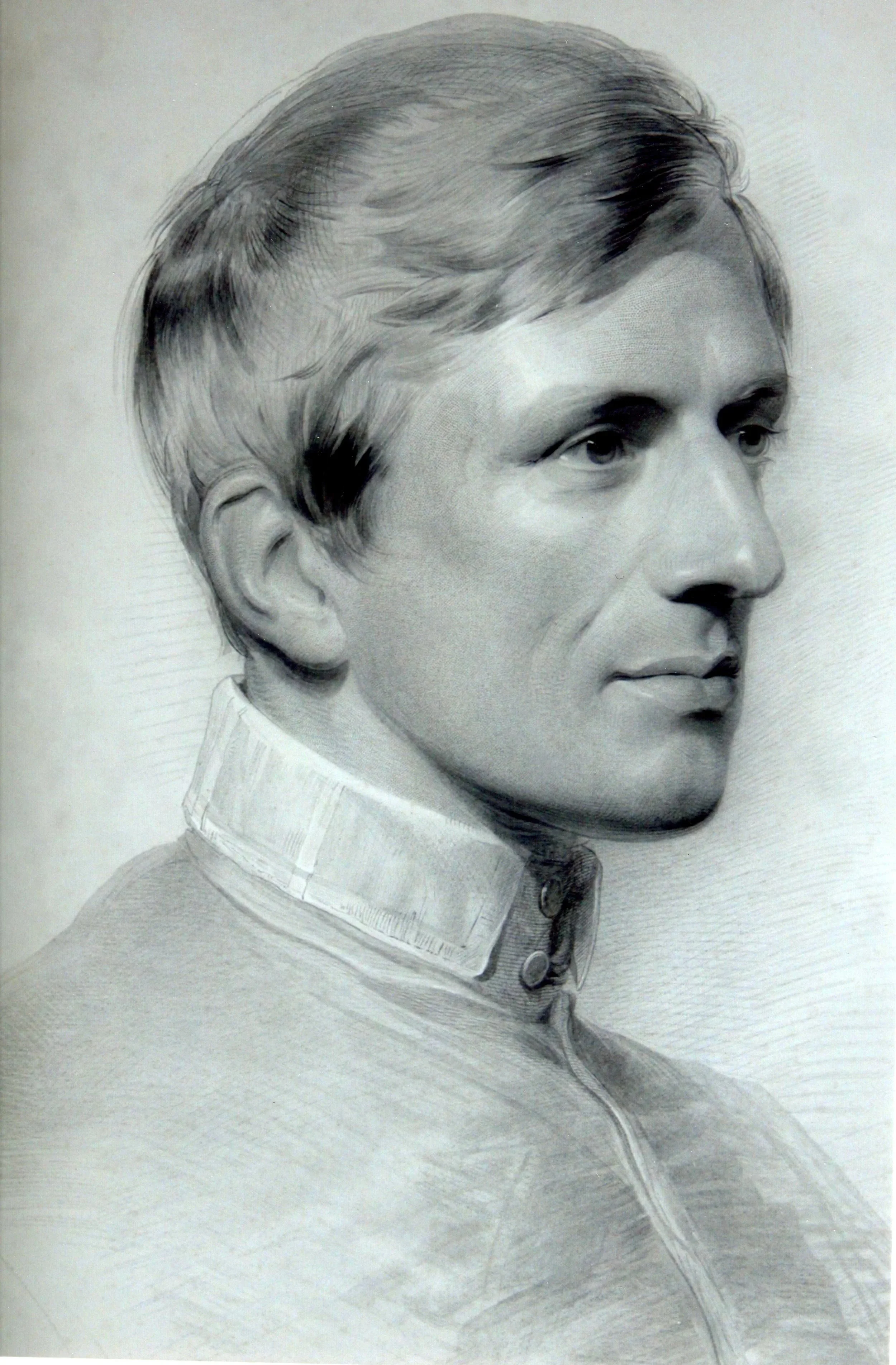
On Common Ground :
The Spiritual Lives of St. Teresa of Jesus and St. John Newman,
Doctors of the Church
History has a way of creating unlikely partnerships. And this instance is perhaps no different. There are not many who would pair together two persons, who are each, individually, a giant on their own. Yet, in taking a closer look, we can see how “similar” our two present heroes really are, even in their differences. Let us start from the beginning.
Both St. Teresa of Jesus and St. John Newman are best known through their personal writings, especially, through their autobiographical works. {1} And surprisingly enough, both saints felt somehow compelled to write “their spiritual journey” as a defense in the face of misunderstanding and even “criticisms” received. Teresa, wrote the Book of Her Life at the bequest of her spiritual director and others who wanted to have a clearer understanding of “her way of prayer.” There were those who were skeptical about her experiences and some even felt it was all the work of the devil. John Newman, in a similar vein, also wrote his revelations of the development of his religious belief specifically as an apologetic work, in direct response to a calumnious claim of an Anglican minister against him, giving it the title of Apologia Pro Vita Sua. Neither John Henry nor Teresa had any idea of the spiritual impact and import that these writings (almost written in their blood) would have on the hearts and minds of the faithful for years to come!
During the days of the Novena to St. Teresa, we will be sharing with you more meditations on the lives of these two great Saints! Stay tuned!
1. In history, no other autobiographies have had such impact on the lives of so many as have those of St. Augustine, St. Teresa of Jesus and St. John Newman.

On Common Ground : The Spiritual Lives of St. Teresa of Jesus and
St. John Newman,
Doctors of the Church
GRACED BEGINNINGS
As we continue to reflect on the spiritual life of our two illustrious saints, let us now zoom in on the special graces both St. Teresa of Jesus and St. John Newman received during the early years of their lives. These bear witness to us that even then, they were already “marked” out for great things. Let us begin with Teresa.
We are all familiar with the story. As a young girl, Teresa was captivated by the lives of the Saints. Together with her favorite brother, Rodrigo, their stories filled her days with countless inspirations, opening her tender mind with thoughts of God and of Heaven. Until one fine day, convincing Rodrigo to accompany her, they set off “to the land of the Moors” where they were determined to die as martyrs and so gain Heaven in a flash! Fortunately, they were intercepted by their Uncle, and brought back home against their will. They then spent endless hours together “playing hermits” and giving their lives to God. These unique experiences in the live of Teresa left their mark, both because she never forgot them, but also because they were a “foretaste” of that true vocation that she was destined to embrace in Carmel.
Our dear St. John Newman, also had singular “spiritual experiences” as a young boy, catered, of course, to his own personality and graces, which could easily be mistaken or overlooked. In his Apologia, he recounts that, as a child, he somehow had a sensation he was “an angel” and the world an estrangement. This, of course, was his childhood manner of expressing a “supernatural” awareness of the spiritual life, that had not been easily explained to him in his religious beliefs at that time. This awareness would later prove pivotal for him at that moment of his “conversion” into the Catholic faith, for it afforded him an interior groundwork by which he could smoothly and easily enter, with the assent of his whole being, into what, intellectually had kept him at bay for many years: the Catholic teaching of the Communion of saints. At the right moment, therefore, his mind was finally able to embrace, what his heart had always held at its own.
Today is the Feast day of St. John Newman. October 9, 1845, was the day in which he was received into the Church by the Passionist, Blessed Dominic Barberi and became a Catholic.
STAY TUNED FOR MORE!
Second Reflection

On Common Ground : The Spiritual Lives of St. Teresa of Jesus and
St. John Newman,
Doctors of the Church
Friendship: A Mirror for the Soul
As we continue to journey along the spiritual path of our dearly beloved saints, Teresa and John Henry Newman, we pause now to reflect upon a very well-known trait found in both of them: a noble idea of human friendship. Both Teresa and John enjoyed long, loyal friendships throughout their entire lives. Friends of their youth, friends of their ideals, friends that lasted all life long. Friendship was central to their way of life, because it was a unique gift that helped them to love God more. There is no denying, of course, that their experience of friendship had to be purified, most especially in St. Teresa. But this only served to bring them to a deeper understanding of its importance as well as its undeniable limitations.
St. Teresa, for example, was able to realize that true spiritual friendship served a purpose in her life, becoming like a mirror of the mystical experience of God in her soul. For her friendship became the source of a fruitful exchange of one’s personal experience of God for the edification of both. She teaches: “For this reason, I would counsel those who practice prayer to seek, at least in the beginning, friendship and association with other persons having the same interest. This is something most important even though the association may be only to help one another with prayers. The more of these prayers there are, the greater the gain. … I don't know why it is not permitted that persons beginning truly to love and to serve God talk with some others about their joys and trials, which all who practice prayer undergo. For if the friendship they desired to have with His Majesty is authentic, there is no reason to fear vainglory. … I believe that they who discuss these joys and trials for the sake of this friendship with God will benefit themselves and those who hear them, and they will come away instructed; even without understanding how, they will have instructed their friends.” (Life 7) How much St. Teresa came to understand about herself, about God and about others, through her friendships!
St. John Newman’s benefit from friendship was also rooted in God, albeit with a slightly different interaction. For him, true spiritual friendship was for the mutual enlightening of one’s experiences of God that came from their knowledge of Him; a mirror in which to apprehend better this knowledge so intimately bound to one’s love for Him. In a letter to a dear friend, St. John Newman writes: “Your letter just received is a great relief to me. I was employed still concocting ditch water to my great disgust instead of the champagne when your letter greeted me. It is a real comfort to have the opinion of another person, and especially yours.” (Letter, Feb. 8, 1864)
St. Teresa and St. John Newman were so uniquely in touch with their inner life, so aware of the movements in their soul. Not from an unhealthy preoccupation with self, but from an innate awareness that the “soul” was the truest meeting place between man and God. And this, too, can be shared in friendship.
STAY TUNED FOR MORE!

On Common Ground : The Spiritual Lives of St. Teresa of Jesus and
St. John Newman,
Doctors of the Church
That Unique Relationship between Faith and Reason
Our final reflection leads us to ponder upon one of the oldest questions ever posed, and which is still a source of reflection today: what is the relationship between faith (belief in the supernatural order) and reason (knowledge obtainable to us through the natural order, that is our senses and intellect), and can there be one, anyway?
Our Catholic faith has always held that our Saints are those unique “mirrors of truth” reflecting the values and reality of life and creation so that they may be more easily perceived by the rest of us. And what is most fascinating about this, is that they reveal these truths in ways so simple and so beautiful, that it is a delight to behold them! And in Teresa and John Henry, this is no less true, even in a topic so difficult to reconcile as this one. The spiritual journeys of St. Teresa and St. John Newman seem to reveal to us two sides of the “single coin” of this issue, both very approachable, both edifying, showing that faith and reason are inseparable. In St. Teresa we see faith that seeks to comprehend, while in St. John Newman, we see reason that recognizes its need to be illumined by faith.
St. Teresa writes: “It seems to me that you're still not satisfied, for you will think you can be mistaken and that these interior things are something difficult to examine. … I want to mention a clear sign by which you will be sure against error or doubts about whether the union is from God. … In difficult matters even though it seems to me I understand and that I speak the truth I always use this expression "it seems to me." For if I am mistaken, I am very much prepared to believe what those who have a great deal of learning say. Even though they have not experienced these things, very learned men have a certain "I don't know what;" for since God destines them to give light to His Church, He enlightens them that they might acknowledge a truth when presented with it.”
St. John Newman, for his part, wants us to grasp the delicate balance that must exist between the mind that seeks for truth (reason) and uprightness of a moral life (religion). For him, religion is as equally important for the “divine truths” that it reveals to us, as for the moral precepts that it teaches, which are, perhaps even more important to keep our minds from falling into error. His Oxford Sermons are a great source for understanding this. One except must be sufficient for us: “It cannot be denied, however, that the true philosophical spirit did not begin to prevail till many ages after the preaching of Christianity, nay, till times comparatively of recent date. … And doubtless it may be true, that though a divine philosophy had never been given us from above, we might still have had a considerable advantage over the ancients in the method and extent of our scientific acquirements. Still, admitting this, it is also true that Scripture was, in matter of fact, the first to describe and inculcate that single-minded, modest, cautious, and generous spirit, which was, after a long time, found so necessary for success in the prosecution of philosophical researches.” St. Teresa, in her straight-forward way, agrees fully: “And if they [learned men] do not live a dissipated life but are God's servants, they are never surprised by His grandeurs; they have come to understand well that He can do ever more and more.”


